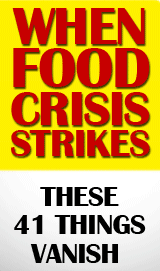Citizens carried placards and banners reading “Down with the international community” and “Down with Sarkozy,” while chanting slogans in praise of junta leader, Captain Amadou Sanogo. [1] Although Sanogo has visited the US several times after being handpicked by the Pentagon to participate in an International Military Education and Training program sponsored by the US State Department [2], representatives of the United States have called on coup leaders in Mali on to step down and allow for elections to take place. [3]
US State Department spokesman Mark Toner has threatened the penurious West African state with a staunch diplomatic and financial embargo if power is not returned to ousted Malian President Amadou Toumani Toure within seventy-two hours. [4] While half the population lives on less than $1.25 per day [5], the imposition of economic sanctions to the landlocked import-reliant nation will inevitably lead to greater social instability and civil unrest.
As the prospects of embargo work to further nurture war-like conditions amid longstanding poverty, the ECOWAS bloc has put its troops on standby near Mali’s borders, ready to intervene should the situation deteriorate. [6] During the 2010 – 2011 crisis in Côte d’Ivoire, forces loyal to the French-backed Alassane Ouattara undertook a widespread campaign of atrocities against civilians [7], a further reminder of the danger posed by the international community’s rush to military intervention in crisis stricken regions of Africa.
As the United States and others espouse the importance of returning to constitutional order, while Malians offer their support to the junta, the strength of Mali’s touted democratic institutions appear highly questionable. The primary justification behind the coup came from the civilian government’s inadequate response to an ongoing campaign of Tuareg separatism in northern Mali, although the recent disarray in Bamako has prompted the steady advance of armed Tuareg militias southward.
Under the banner of the National Movement for the Liberation of Azawad (MNLA), armed militias have reportedly seized the northeastern region of Kidal, prompting the poorly equipped Malian army to abandon its strategic northward positions. [8] The Tuareg are a traditionally nomadic and pastoralist ethnic minority group of some 1.5 million people who seek to secede from the Malian republic and form an independent nation called Azawad; the group has traditionally existed in a territory scattered across the Sahel and Sahara countries largely operated by al-Qaeda in the Islamic Maghreb (AQIM).
 Although the Tuareg have been credited with the recent destabilization in Northern Mali, a strong possibility exists that AQIM has more accurately been behind insurgent activity in the region. [9] The MNLA has stated that the objective of its independence campaign is develop a stronghold from which to safeguard against violent AQIM activity, while Bamako has asserted that the MNLA seek to found a ridged Islamist state in partnership with AQIM. [10] Subsequent to the fall of Gaddafi in NATO’s Libyan war-theater, armed Malian and Nigerien ethnic-Tuareg fighters were seen descending into the Sahara in army issue Toyota Hi-Lux technical trucks used by al-Qaeda affiliated Libyan rebels [11].
Although the Tuareg have been credited with the recent destabilization in Northern Mali, a strong possibility exists that AQIM has more accurately been behind insurgent activity in the region. [9] The MNLA has stated that the objective of its independence campaign is develop a stronghold from which to safeguard against violent AQIM activity, while Bamako has asserted that the MNLA seek to found a ridged Islamist state in partnership with AQIM. [10] Subsequent to the fall of Gaddafi in NATO’s Libyan war-theater, armed Malian and Nigerien ethnic-Tuareg fighters were seen descending into the Sahara in army issue Toyota Hi-Lux technical trucks used by al-Qaeda affiliated Libyan rebels [11].
While it may be difficult to distinguish the true protagonists of violence in northern Mali, the resurgence of their activity has been greatly enhanced by their access to mortars, machine guns, anti-tank and anti-aircraft weapons originally belonging to the radical Libyan Islamic Fighting Group (LIFG). [12]
The crisis in Mali bears a striking parallel to events in Nigeria, a nation struggling with the Islamic insurgent activities of separatist Boko Haram to its north. Given the political instability in Abuja, a coup orchestrated by low-ranking officers against Nigerian president Goodluck Jonathan based on the Malian model would not be unthinkable. As the World Bank and African Development Bank suspend all aid to Mali, some form of military intervention is conceivable if the UNSC’s calls for the “immediate restoration of constitutional rule and the democratically elected government” are not heeded [16].
 As Mali’s neighbors threaten to use sanctions and military force to depose the current Committee for the Re-establishment of Democracy and the Restoration of the State (CNRDR) led by Captain Amadou Sanogo [17], the junta has unveiled a new constitution guaranteeing freedom of speech, thought and movement [18]. Sanogo vowed not cling to power and to set up democratic elections when the Tuareg insurgency can be contained; those who took part in the coup would be barred from participation in the elections [19]. The influx of arms from NATO’s regime change programme in Libya has created dire prospects for a heavily armed civil war in Mali; it remains to be seen how the NATO bloc will react if the CNRDR refuses calls to step down and engages in a drawn-out conflict with Islamist separatists.
As Mali’s neighbors threaten to use sanctions and military force to depose the current Committee for the Re-establishment of Democracy and the Restoration of the State (CNRDR) led by Captain Amadou Sanogo [17], the junta has unveiled a new constitution guaranteeing freedom of speech, thought and movement [18]. Sanogo vowed not cling to power and to set up democratic elections when the Tuareg insurgency can be contained; those who took part in the coup would be barred from participation in the elections [19]. The influx of arms from NATO’s regime change programme in Libya has created dire prospects for a heavily armed civil war in Mali; it remains to be seen how the NATO bloc will react if the CNRDR refuses calls to step down and engages in a drawn-out conflict with Islamist separatists.
As the US military counters the Lord’s Resistance Army by expanding its military presence through AFRICOM (United States Africa Command) in the Democratic People’s Republic of the Congo, the worsening situation in both Mali and Nigeria provide further justification for foreign intervention and war profiteering.
[19] New Mali leaders reveal constitution, Russia Today March 23, 2012
Article originally posted Nile Bowie’s blog here. Nile Bowie is a syndicated freelance writer and photojournalist based in Kuala Lumpur, Malaysia.
linkwithin_text=’Related Articles:’



Be the first to comment on "Separatist War looms in post-coup Mali"